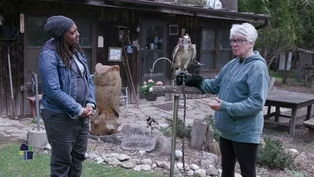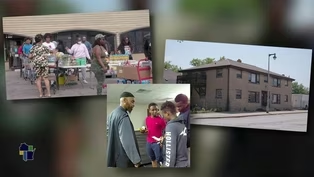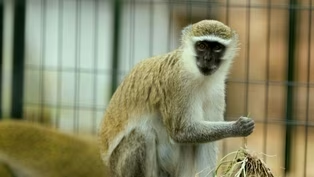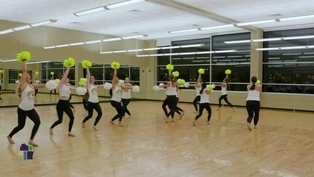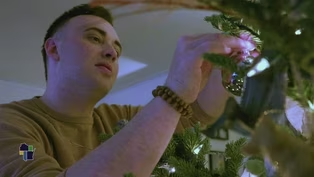
Pine View Wildlife Rehabilitation & Education Center
Season 9 Episode 9 | 26m 47sVideo has Closed Captions
Explore the Pine View Wildlife Rehabilitation Center in Fredonia with Angela Fitzgerald.
We explore the Pine View Wildlife Rehabilitation & Education Center in Fredonia as they work to rescue and release animals back into the wild. Angela Fitzgerald learns from animal ambassadors including an owl and bald eagle. Then we meet the founder of a primate sanctuary and a designer decorating the White House for the holiday season.
Problems playing video? | Closed Captioning Feedback
Problems playing video? | Closed Captioning Feedback
Wisconsin Life is a local public television program presented by PBS Wisconsin
Funding for Wisconsin Life is provided by the Wooden Nickel Fund, Mary and Lowell Peterson, A.C.V. and Mary Elston Family, Leon Price & Lily Postel, Stanley J. Cottrill Fund, UW...

Pine View Wildlife Rehabilitation & Education Center
Season 9 Episode 9 | 26m 47sVideo has Closed Captions
We explore the Pine View Wildlife Rehabilitation & Education Center in Fredonia as they work to rescue and release animals back into the wild. Angela Fitzgerald learns from animal ambassadors including an owl and bald eagle. Then we meet the founder of a primate sanctuary and a designer decorating the White House for the holiday season.
Problems playing video? | Closed Captioning Feedback
How to Watch Wisconsin Life
Wisconsin Life is available to stream on pbs.org and the free PBS App, available on iPhone, Apple TV, Android TV, Android smartphones, Amazon Fire TV, Amazon Fire Tablet, Roku, Samsung Smart TV, and Vizio.
Providing Support for PBS.org
Learn Moreabout PBS online sponsorship- The following program is a PBS Wisconsin original production.
- Angela: Coming up on Wisconsin Life: Meet the founder of a primate sanctuary, the director of a mosque helping curb hunger in his community.
A dance team stepping up to the competition.
And a decorator preparing the White House for the holiday season.
That's all ahead on Wisconsin Life!
[lively music] - Funding for Wisconsin Life is provided by Lowell and Mary Peterson, Alliant Energy, A.C.V.
and Mary Elston Family, Focus Fund for Wisconsin Programs, and Friends of PBS Wisconsin.
- Hello, and welcome to Wisconsin Life.
I'm Angela Fitzgerald.
Today, we're taking a walk on the wild side as we visit the Pine View Wildlife Rehabilitation and Education Center.
The center, located in Fredonia, is spread across two campuses, both dedicated to serving the natural world and surrounding communities.
It all started with one woman's vision to care for injured and abandoned wildlife.
Now, more than 40 years later, a loyal team of staff and volunteers continue to uphold that tradition as they rescue and rehabilitate a variety of wildlife each year, including birds of prey, predatory mammals, and even reptiles and amphibians.
Each case brings a new set of challenges and outcomes, from animals who have lost their mothers to birds that can't be re-nested.
But the goal remains the same: releasing wildlife back into their natural habitats.
And the work doesn't stop there.
As an education center, Pine View welcomes visitors for tours while working with communities to teach them how to incorporate wildlife and the environment.
Before we dive too far down a rabbit hole, let's meet someone else who's working to make a difference in the lives of others.
We travel to Westfield to meet the founder of a sanctuary giving primates a safe and comfortable place to live.
[playful orchestra music] - Amy Kerwin: Rhesus monkeys, they're overlooked so often.
They can live to be 35, 40 years old.
They're just very smart in living in their large troops.
And they're one of the most popular monkeys in research, in drug development testing, and toxicity testing.
And so, you know, knowing that, I like to say, "At Primates Incorporated, the least we can do is give back to them whenever possible."
I'm Amy Kerwin, founder of Primates Incorporated, the non-profit monkey sanctuary.
We're home to nine monkeys here at the sanctuary.
Five are retired from the pet trade, and four from laboratories.
[monkeys calling] We're providing a dignified and spacious environment to these monkeys.
Often, they're resold to more studies, or I have heard of cases where they would be put down.
And so, I'd like to see less and less of that as more sanctuary space is available.
[perches clattering] - Amber Zorn: I mean, she has shown that it's possible to build a sanctuary in Wisconsin that's for monkeys, which has never been done.
And it's the only one like it in this whole country.
- Amber Zorn: I am the primate caregiver here.
Giving them enrichment, cleaning, of course, and just doing everything to make sure that their day-to-day life is as great as it can be.
[mellow, playful instrumental music] - Amy Kerwin: And so, the act of retiring them, yes, means researching how they live in the wild.
To get to know the primates as part of their own species versus how they compare to us.
- Amber Zorn: So, inside of the toilet paper roll are raisins.
This way, it's kind of a natural way that they would be able to do it in the wild to get food, bugs, or anything like that that they'd be looking for in the wild.
- Amy Kerwin: So, Izzle is a very dominant monkey, but he was shown grooming himself, lip-smacking at other monkeys, loving his mirrors and enrichment, foraging in the pool and through the straw.
And so, just to see this monkey feeling out his environment after he was retired here at age 14.
He was once labeled as "aggressive" in the lab, and singly-housed.
To show that he now has a partner is a true sign of rehabilitation.
- Amber Zorn: He's done a complete 180 since coming from the lab, which is amazing to see.
- Amy Kerwin: Each of them has their own individual personality.
So, I guess I could say I love them all equally.
[rolls barrel into gate] [Amber Zorn tries to suppress laughter] - Amber Zorn: And sometimes, it's not that graceful.
[monkey wobble calling] - Amy Kerwin: You know, there were a lot of naysayers.
It's like, "Why even try helping them?"
And it's like, "Well, they're wild animals."
They deserve dignity and respect.
But I always look at that as, I knew the need existed, and I knew that not just myself could be the one to solve the problem, and that there's other caring individuals.
[gentle music] But there's a need to establish a sanctuary in every state so that no monkey ever gets turned away again.
[gentle music] Because they're so similar to us.
And just knowing how each and every one of them are, I'd like to see them all be retired.
♪ ♪ - We're now off to Milwaukee to catch up with a leader at a local mosque that's become an important part of the community.
[Islamic call to prayer] Hayya ala-Salah (Hasten to prayer...) - Milwaukee's Islamic Da'wah Center is a place for faith.
Ashadu anna Muhammadan Abduhoo wa Rasuloo, (I bear witness that Muhammad is the servant and messenger of God) balagha risaala.
(and in the eloquent message.)
- Fellowship.
- Get you something to drink.
This ginger beer's good.
- Angela: And for Brother Will Perry, a focus on what's important.
- And here you find Muslims from all over the world that come here to worship, to learn about their religion, to practice their faith.
- Angela: Brother Will spent almost three decades as a Milwaukee firefighter.
- So I thought I had the best job going then.
The 911 call is made.
You respond to the call.
You take care of whatever that emergency is, and you're done with that one.
- Angela: After retiring in 2006, he still felt the call to help others.
- Will Perry: It's a spiritual responsibility on my part to be of service to the best of my ability and within the guidelines that's legislated within Islam.
- Angela: That's why he took the role of Executive Director at the Da'wah Center.
- I'm kind of on that other side of the hill right now.
So I've gotta be thinking about, "What do you leave behind?"
- Angela: He's leaving a legacy of service.
He helped the center start a weekly food pantry.
- Brother Will Perry: This is an opportunity for us as a religious-based organization.
One of our creeds is to feed other people.
Regardless of who they are and where they're from.
So, we began the food pantry in 2007, out of my minivan at the time.
- Angela: It's grown from a small pantry out of a minivan to this.
[lively upbeat music] Truckloads of food, dozens of volunteers, cars lined up and down the street.
With the help of several community partners, this pantry is now a crucial lifeline.
- I hope y'all got some bread so I can feed the animals.
- We got bread in there; We got bread.
We got a little bit of everything over there.
- We touch hundreds of people every single week.
And it's had a significant impact on the quality of life for a lot of people.
Thank you for coming; Appreciate you.
- I be coming here for 12 years.
- Twelve years you've been here?
- Yep!
- That's a blessing.
- Angela: Brother Will says they give away more than 10,000 pounds of food a week, curbing hunger in this North Milwaukee neighborhood.
- It doesn't matter whether you come here to worship or not.
It's our duty to be of service, and that's what we do.
- Angela: But this isn't the only Da'wah Center program making a difference.
[traffic noise] Down the street, the Ibrahim House is a living space and re-entry program for those leaving incarceration.
- When you get out, you can have a job, you can have a job, you can go to school, but housing is hard.
- Angela: James Watkins spent more than two decades in prison.
- And so, when these guys come out, they come out, and we are holding their hands and helping them through the process of re-entry back into society.
- Angela: The Ibrahim House Program provides the support to chart a new path.
- Brother Will: They get their own apartment, eventually get their own house, and they contribute back to the community here.
- Angela: That's what James is doing.
He's now an instructor at Marquette.
- It was a long road, but I had support.
Like, I had Brother Will.
I'm talking about his story, never really gets told.
Like, all the stuff he do.
He constantly, like, talk to me.
He constantly encouraged me.
He constantly supported me.
- Angela: It's all part of a life in service.
- Food pantry, prison re-entry, education, community service, working with religious and non-religious entities in our community.
Working, putting those folks together in a common goal.
That's all part of worship, too.
Okay.
- Angela: So, Brother Will says, don't expect to find him anywhere else.
His focus is on the Da'wah Center, his faith, and his community.
- It's the best thing going.
I don't see myself going anywhere else or doing anything else.
This is pretty much it.
I'm gonna be here, and I'm committed to this community until I'm done.
[lively music] - We're in Fredonia, learning what it takes to rescue wildlife of all shapes and sizes, and return them back to their natural environment.
Pine View Wildlife Rehabilitation and Education Center specializes in working to rescue and release birds of prey, predatory mammals, reptiles, and amphibians.
My first stop on the property was to chat with Jeannie Lord, who founded the non-profit in 1981.
Which is to tell us about the mission and vision of the center?
- We have not deviated from our first day on the property.
- Angela: Mm-hmm.
- And that is to not only address and help assist wildlife, to rescue, recognize that a bird or a mammal or reptile or an amphibian needs intervention, to rehabilitate them, to get them back to the wild where they belong.
But it's combined with our educational mantra that if you can't eat it, don't shoot it.
That if you find a species out in the wild, it is okay to look, to learn, to leave it.
- And what is our other guest's name?
- Our other guest is Paydakahn.
He is a small, male red-tailed hawk.
What's special about Paydakahn?
He was a victim of misuse of firearms and judgment, and so, technically, he's blind.
And he is our educational ambassador, to assist us in getting the message out, not only on the uniqueness of our birds of prey, also to respect them.
And there's no such thing as legally shooting a bird such as this.
It's against the law.
- Angela: Supporting those educational mantras are a wide range of animal ambassadors, who are cared for by Kristen Bustamante.
- So, this is Soren, our educational ambassador, great horned owl.
He is actually visually-impaired, which is kind of why he does a little bit of the drifting.
We do have one who is an imprint, which means he is unable to be released back to the wild because he was actually kept as a pet.
- Angela: Wow.
- Kristin Bustamante: So he does not actually know what he is, which is why it is so important at that time to not bring these young, immature baby owls, birds, mammals, anything into your home because of the devastating long-term impacts that they have.
- So, Kristen, can you tell us about our next ambassador?
- Yeah, so this is our educational ambassador, Painted Turtle.
If you haven't seen one in the wild, they look quite different from this.
So, the point of the shell is it is their home.
Unfortunately, this one does not have that protection because of the poor nutrition that it was fed, and lack of sunlight, Vitamin D. And it was kept in a very small aquarium.
It will never be able to be released.
- So I've seen plenty of these guys in pet stores, and there's care instructions, food sources, all of that.
But it sounds like even people who use that approach and are following all the instructions from that setting still aren't giving the turtle what it needs.
- Yeah, and unfortunately, the instructions that you're given from pet stores are not always accurate.
A lot of the times, you're gonna get something like this to be able to feed them, and-- - Floating food.
- Yes, floating food.
And this does not constitute or make up any of the 64 different things that this painted turtle will be able to eat in the wild.
But people just don't know because they're not educated appropriately.
- So, that's where the theme of, "If it's wild, leave it there."
- Yeah.
- Thank you for that, Kristen.
- Mm-hmm, absolutely.
- Angela: From their work to release animals back into their natural habitats to these animal ambassadors, Pine View is working to protect, educate, and keep Wisconsin wild.
A lot goes into caring for wildlife.
And teaching future generations to do the same.
Next up, we join members of a dance team at the University of Wisconsin Oshkosh, who are stepping up their routine to pull ahead of the competition.
[lively music] When Leeah Justman and Jenna Riche met at the University of Wisconsin Oshkosh, they had at least one thing in common.
- So I've been dancing since I was three.
- I have been dancing since I was in third grade.
- Angela: Both now compete for the UWO dance team, along with young women from across Wisconsin.
- Here we go!
[lively music] - Dancer: One, two, three, four.
- Molly Wandersee: We have a couple of girls from, like, the De Pere/Green Bay area.
From, like, Stevens Point, Wausau, so, like, the middle of the state.
We have a lot of girls from the Milwaukee area.
- Dancer: One, two, three, four, punch, fly.
- Angela: Jenna and Leeah are part of a dance team that is 100% student-led.
- We are student athletes.
So student comes first, athlete comes next.
[lively music] - Yeah!
- Good work!
- Whoo!
- Angela: It's a sport sidelined by the pandemic.
- Dancer: Ready?
- And their dream of dancing at Nationals had been dashed.
- Jenna Riche: Gosh, it was a very emotional time.
COVID had sent us home right before Nationals.
It was so incredibly heartbreaking for our team.
- Dancer: Ready?
- Leeah Justman: And it was really sad to see those seniors and those juniors that weren't coming back.
They weren't gonna get that chance.
- Angela: The team would regroup in 2021, with one big difference.
- Jenna Riche: We had just almost a completely brand new team who had never competed for UW Oshkosh.
And we put our best foot forward in everything we did so that we could come back stronger and better.
- Dancers: U-W-O!
- Molly Wandersee: Everybody pushes each other to do better and to be better.
[calling out dance steps] - There you go!
- We have a zero-drama policy, and that is so true.
- You guys come in.
- Yep.
- Okay.
- Angela: By the end of the season, there would be plenty of drama.
- Leeah Justman: You gotta be ready to come to every single practice, ready to win.
And ready to do your best every single time.
And if you don't, then you're kind of letting your teammates down.
- Angela: They used the pandemic as motivation.
- Molly: Come on, ladies, pick it up!
Five, six, seven, eight.
- Angela: They wanted redemption.
- Dancer: Up, hit, hit!
- Angela: And a shot at Nationals.
- Molly: Nice job, Sabrina, hit!
Let's go!
- Angela: They spent months.
- Leeah: Yes, months and months and months.
- Angela: Preparing for that national competition COVID had denied them.
- Dancer: Four, five, and six, seven, and eight.
- Jenna: So it was doing parts over and over and over until it was genuinely perfect, and every girl looked exactly the same.
- Dancer: Hit, hit, hit, hit!
Yeah!
[dancers cheer] You can do it!
[happy laughter] - Angela: The countdown was on.
For the first time in two years, this team would represent UW Oshkosh at the National Dance Alliance College Championship in Daytona Beach.
- Before we went on the floor, we definitely talked about dancing for those people who didn't get that last performance.
[applause] When you hit that first pose, and you're about ready, the music's about to start.
You gotta take that nice deep breath.
As soon as the music starts, you just go for it.
[inspirational music] - Molly Wandersee: They put a lot of work into their performances and you can definitely see that when they put all of that out on the floor for them.
- Jenna Riche: Those last 15 seconds, I could feel the tears start to swell in my eye because I was so grateful for the opportunity to be able to do this for so long, and love it so much.
- Angela: Now, it would be up to the panel of judges.
- Jenna Riche: I just remember saying, "Whatever happens, we did it.
"We put the best performance out there.
"The best performance that could be done was out on that floor."
- Announcer: National Champion, with the final score of 89.20, the University of Wisconsin Oshkosh!
[wild cheers and applause] - Leeah Justman: Going into this year, we were never expecting to win.
- Team: Five, six, seven, eight.
[cheering exuberantly] - Angela: UWO did win.
Bringing back to Wisconsin its first-ever national championship for poms.
And a third-place finish with their jazz routine.
- Leeah Justman: I think after working for 18 years towards this big goal, it was just so fulfilling.
- Jenna Riche: It makes it feel like all the years, and the hard times, and the good times, and everything in between, was worth it.
- Leeah Justman: We represent UW Oshkosh, the Titans.
Just an amazing experience.
- Dancer: Five, six, seven, eight.
- All: Titans, whoo, whoo!
U-W [clap] O!
[happy chatter in background] - Angela: For our last story we go to Milwaukee, where a decorator works to spruce up one of America's most famous homes for the holiday season.
[Christmas music] ♪ Sleigh bells ring ♪ - If I could, my tree would be up starting October 1st.
- Angela: To say Collin O'Brien enjoys decorating for the holidays would be an understatement.
- Looking back, I'm sure my reason was I'm just Christmas-obsessed.
- Angela: That obsession will serve Collin well.
- Collin O'Brien: When I first applied, they wanted to know, "Why you love Christmas?
What does it mean to you?"
In a humble way, I think I am talented.
But I think maybe I was chosen because I just purely love the idea of Christmas.
It was just about having the honor of going to the White House.
- Angela: Yep, the White House.
- Collin O'Brien: If you are a Christmas fanatic, what better house to decorate, besides yours, than the White House?
[chuckles] - Angela: It would be a once-in-a-lifetime opportunity, or so Collin thought.
- It is very crazy because the first year you go, you meet these hundred-some volunteers from across the country, and we all have the same coalescing feeling that, "Oh, my gosh, this is a once-in-a-lifetime opportunity."
I remember when I got invited the second year, I thought I should get a lottery ticket.
This is amazing.
- Angela: For six straight years, Collin has given up his time with family at Thanksgiving to decorate the executive mansion.
- Collin O'Brien: It's weird 'cause it's technically a museum and home all in one.
But when you're there, it does feel homey in a weird way.
Some people stay in one room the whole week, depending on how big the design is.
Like, if you're doing the Blue Room tree, which has the official tree, that's like 20-foot tree, super wide.
- Angela: For the volunteers, not every project is met with a twinkle and a smile.
- Collin O'Brien: I remember one year I did the Blue Room tree.
We were on scaffolding, and you were inside the tree wrapping lights.
And I was going home covered in sap.
Clothes were ruined.
It was not a fun year.
[laughs] - Angela: Other years, the fun comes in twos.
- Collin O'Brien: One year during the Obamas, they made these eight-foot-tall statues of their two dogs, Bo and Sunny.
One by one, volunteers made thousands of pom poms.
And the pompoms that were hot glued onto the chicken wire to look like the dogs.
- Angela: Volunteering at the White House also has its perks.
- You get to see the First Lady actually walk down the residential steps.
She thanks everybody.
So, this was the year with Melania Trump.
This was Michelle Obama that was coming down to chat with us with, of course, [laughs] Secret Service behind her.
So that was a memorable experience.
- Angela: With every passing year came new memories and milestones.
- I got to do the Palm Room two years in a row, where they gave me tons of spools of ribbon, and they said, "Can you make a plaid weaving through the walls?"
That took a lot of time and effort.
- Angela: In 2021, Collin added another honor in the nation's capital.
- This year, I got offered the opportunity to decorate Blair House.
I didn't know what to expect.
I knew it was the official President's guest house.
So this was the Truman Room I got to decorate.
There's a lot of deep reds and golds.
- Angela: On Collin's home tree, there are reminders of his days at the White House.
- This is kinda like our White House room.
[laughs] And on here, I have ornaments that were actually hung in the White House that were gifted to me.
This is a big ornament that was hung during the Obamas' last two years.
So, really special unique things that, obviously, you can't buy.
- Angela: For Collin, this unique opportunity isn't easy to explain.
- As like the year of the White House and we all-- It's such a niche experience.
It's hard to describe it.
Hard for everyday people who have not done it to get a sense of what it's like.
It's a rush of adrenaline and emotions.
It has definitely given me more confidence than I've ever had in life.
And it really empowers you to be yourself.
I remember one year I wore a full ballgown skirt inside the White House 'cause I wanted to do that.
That felt right to me.
And no one bats their eye.
In my way, this is my service to the country.
It is my way of giving back.
It's doing what I can do.
It's just a sense of pride every time I go in there.
[Christmas music] - We got an up-close look at wildlife and have a better understanding of what it takes to care for them, all while sharing stories that make our state special.
To learn more about the Pine View Wildlife Rehabilitation and Education Center, visit WisconsinLife.org.
Be sure to reach out to us on social media or by emailing Stories@WisconsinLife.org.
Until the next time we go wild, I'm your host, Angela Fitzgerald.
And this is our Wisconsin Life.
Bye!
[inspirational music] - Funding for Wisconsin Life is provided by Lowell and Mary Peterson, Alliant Energy, A.C.V.
and Mary Elston Family, Focus Fund for Wisconsin Programs, and Friends of PBS Wisconsin.
Angela Visits Pine View Animal Wildlife Rehabilitation Ctr
Video has Closed Captions
Clip: S9 Ep9 | 3m 27s | Angela Fitzgerald learns from animal ambassadors including an owl and bald eagle. (3m 27s)
Video has Closed Captions
Clip: S9 Ep9 | 4m 34s | Brother Will Perry is making a difference as director of Milwaukee’s Da’wah Center. (4m 34s)
Video has Closed Captions
Clip: S9 Ep9 | 4m 35s | Amy Kerwin operates a sanctuary where rhesus monkeys get to experience a natural life. (4m 35s)
Video has Closed Captions
Clip: S9 Ep9 | 5m 28s | UW-Oshkosh Dance Team regroups from the pandemic for a run at a national title. (5m 28s)
Video has Closed Captions
Clip: S9 Ep9 | 4m 28s | Interior designer Collin O’Brien helps decorate the White House for the holidays. (4m 28s)
Providing Support for PBS.org
Learn Moreabout PBS online sponsorshipSupport for PBS provided by:
Wisconsin Life is a local public television program presented by PBS Wisconsin
Funding for Wisconsin Life is provided by the Wooden Nickel Fund, Mary and Lowell Peterson, A.C.V. and Mary Elston Family, Leon Price & Lily Postel, Stanley J. Cottrill Fund, UW...
